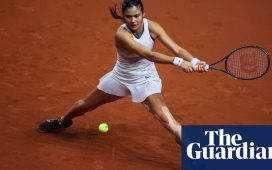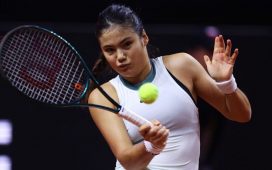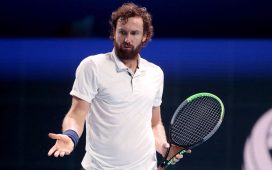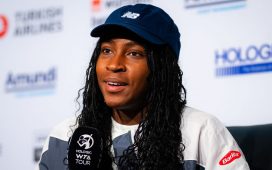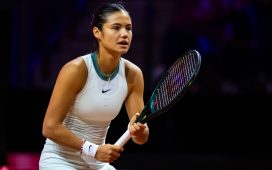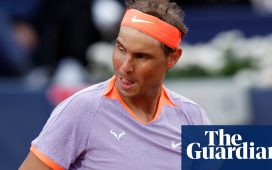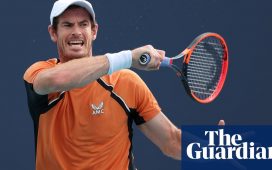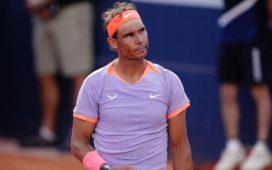Back in Europe, Rafael Nadal and Novak Djokovic only watched the first four sets of the United States Open men’s final before heading to bed after midnight.
That was rather like driving all the way through the desert to the Grand Canyon and never getting to look at the view.
The payoff only came at the tail end of the journey on Sunday night when a mediocre match of wildly fluctuating quality turned into something truly memorable as Alexander Zverev failed to finish off Dominic Thiem, who failed to finish off Zverev, who failed to finish off Thiem, who finally managed to become the first new men’s Grand Slam singles champion since 2014.
“We both had it on our rackets,” Thiem said in an interview with The New York Times on Monday.
That is undeniable and was often agonizing for those viewers who did make it to the fifth set and its decisive tiebreaker. Both finalists wanted their first major title so much that they were sometimes unable to function.
Both cramped from the nerves. But Thiem’s grip on himself was ultimately just a bit stronger and his shotmaking down the stretch quite a bit bolder, including bodacious back-to-back forehand winners down the line that allowed him to hold serve from 30-30 at 4-5 in the final set.
It was not over yet. More breaks, faults, chokes and winners lay ahead. But it could have been over right there and then, with Zverev just two points from victory and enjoying the luxury of not having to worry about the yips he was having on his own serve.
“The level of the match was for me one of the worst finals I saw in my life,” Gunter Bresnik, Thiem’s longtime coach, said in a telephone interview. “But it was two young players trying to do something they’d never done before in their lives.
“For me, the better technique lasts the longest in a match, and Dominic has the better technique and is the guy since 2016 who deserves the Grand Slam title the most whenever the Big Three guys were not in the picture anymore.”
Bresnik began coaching Thiem, a fellow Austrian, when Thiem was 8 years old. Bresnik shaped his game and mentality for 18 years before Thiem broke away last year, hiring Nicolás Massú, the former Olympic singles champion, to be his coach.
“A huge step and a very tough decision,” Thiem said. “Of course I have to thank Gunter a lot. He taught me all the strokes I have, but at the same time I felt there were some little parts of my game that I really can improve so much, and that’s exactly what Nico helped me with, especially the improvement I did and the progress I did on the faster surfaces, on the hardcourts.”
Thiem, 27, also believes that breaking away from his mentor — albeit with his parents’ support — allowed him to take more ownership of his career and even his shots.
“Independence and growing up is so important,” Thiem said. “On court if it’s 5-all in the fifth, you have to take the decision, your own decision. If you are free outside the court, if you have your own team and are taking your own decision, it’s also going to be easier on court to take those decisions. That made a difference last year and also this year.”
For Bresnik, Thiem has always been a step-by-step player, not capable of winning a huge title in his late teens or early 20s but very capable of building up to it.
So it has played out.
Thiem won no sets in his first Grand Slam final: a loss to Nadal at the 2018 French Open. Thiem won one set in his next: another loss to Nadal at the 2019 French Open. Thiem won two sets in his third: losing in five to Djokovic at this year’s Australian Open.
In Thiem’s fourth major final on Sunday night, he won the three sets he needed against Zverev.
Thiem is 4-7 vs. Djokovic, 5-9 vs. Nadal and 5-2 vs. Roger Federer.
Would it have meant more if he could have beaten one of the Big Three along the way to the title in New York?
“Not at all,” Thiem said. “For me, it’s not worth less or more. Whoever I beat, it doesn’t matter to me. I had the chances in my previous finals to beat one of the Big Three or even two of them on the road to a title. I failed, but I hope that I’ll get more chances to do so. There is the French Open around the corner.”
Thiem has been the world’s second best clay-courter behind Nadal for the past three seasons and long imagined that his first Grand Slam title would come on the French Open’s “terre battue” if it came at all. Instead, it came on a quick acrylic hardcourt in New York with virtually no one in the stands.
“For sure not the way I imagined it, but the feeling didn’t disappoint me,” Thiem said. “Such a big relief and such a happy moment when I converted that match point.”
But clay is still his favorite surface, and he cannot be counted out in Paris even if Nadal is a 12-time French Open champion (that is not a typo) and is fresh and jet-lag free after skipping the U.S. Open to train in Europe on clay.
“I’m very sure that physically I’m going to be recovered and ready 100 percent, but the other thing is how I digest the U.S. Open emotionally, mentally,” Thiem said. “It’s really for myself a huge, huge achievement, bigger than anything I have achieved so far in my tennis career, so I’m not sure how I handle this. Now I’m still full of adrenaline and happy feelings from yesterday. But once some days pass by, we will see how I feel.”
Thiem has played one clay-court tour event this season: the Rio Open in February before the five-month tour hiatus caused by the coronavirus pandemic. He also played exhibition events on clay during the break, including the Adria Tour, the misguided circuit Djokovic organized in Serbia and Croatia in June.
Djokovic, Grigor Dimitrov, Borna Coric and other players and coaches tested positive for the virus, but Thiem was not one of them. He said he will not play again before Paris.
“For Dominic to move from any surface to clay, I would say it takes half an hour,” Bresnik said. “He’s so used to it.”
Adapting to becoming a Grand Slam champion might take a little longer, particularly when it was so perilously close to not happening at all.
“You might think winning your first at 27 is really late,” Bresnik said. “But I’ve said for 10 years, the best time for a tennis player today is between 26 and 33. If Dominik would win five to 10 Grand Slam titles in the next five years, I honestly would not be surprised.”
